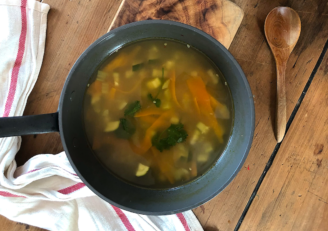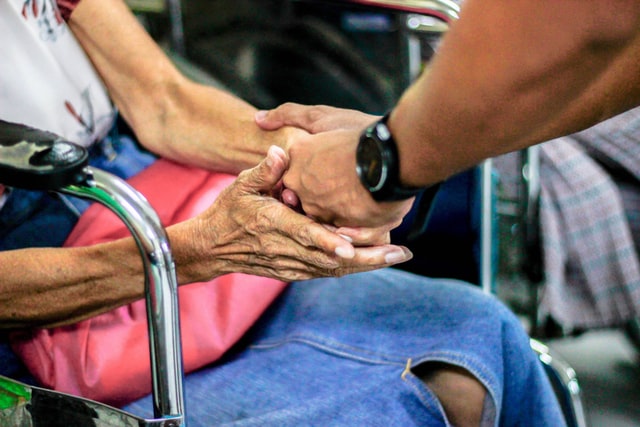
Anyone who is looking after an elderly person will tell you that one of the biggest challenges is getting them to eat their meals. It is a fact of life that as we get older the appetite can decrease significantly and this can lead to illness if not handled properly.
If an older person is receiving care at home from a professional home care provider, then they will have a healthy meal plan drawn up with nutritious, appetising meals cooked for them. And the carer will be adept at encouraging older people to eat their meals. But where a family member is caring for an elderly relative there can be personality clashes and the older person could reject what is being offered. Sometimes it’s simply easier to reject what is offered by someone we are close to. Unfortunately, that means it can be a struggle to ensure the elderly person consumes enough calories each day – and, importantly, enough of the right sort of calories.
So let’s look first at why older people have less of an appetite than in their younger years and the importance of good nutrition for the elderly.
What Causes Loss of Appetite?
Everything changes as you get older and that includes your sense of taste and smell. Foods that you used to enjoy just don’t appeal anymore and, in addition, it becomes difficult to eat and digest large meals.
To stay healthy and fit in old age you just need to follow a few common sense rules and use good quality ingredients in high calorie meals which are easy to eat and digest. The diet should be varied with a good mix of lean protein, healthy fats and fruit and vegetables. Vitamins and minerals are also essential and these have to be worked into meals to offset the natural lowering of absorption of them as we age.
Healthy Foods for Maintaining Weight and Wellbeing
Full fat dairy products such as full fat milk, cream, yoghurts and cheese are essential as these increase the calorie count without adding bulk, as well as providing protein, calcium and vitamin B12 for healthy bones and immune system.
Starchy foods like potatoes, rice and pasta, in moderation, are filling and when combined with tomato sauces and topped with cheese offer a good all round balanced meal. Experiment with different sauces and toppings to maintain an interest in food. Olive oil and pesto are high calorie ingredients that make a tasty addition to pasta dishes.
Try to include plenty of bread in the diet to provide filling calories. Sandwiches are often easier to eat and quicker to prepare.
Nut butters such as smooth peanut butter or almond butter can be used in different ways as these are also easy to eat and are filling and nutritious. They are high in healthy fats which are beneficial for heart health and for lowering blood pressure. A peanut butter and banana combination helps to increase energy levels. Use nut butters in a bowl of porridge along with some dried raisins and apples.
Hearty soups are a very useful addition to a balanced diet as these can be bulked out with vegetables, rice, pasta and potatoes. To make a creamier soup add full fat coconut milk rather than cream for a change. Coconut milk is rich in antioxidants, vitamins and minerals to support heart health as well as skin and hair.
Sources of protein, essential for tissue and muscle health, can be found in most meats plus fish like salmon, tuna and cod and also in seafood. Options for vegans and vegetarians include soya products, beans, nuts and seeds.
Variety is Important
Variety and interest is what stimulates the appetite and, don’t forget, to ensure hydration levels are kept up to boost blood circulation. If you struggle to persuade your loved one to eat a healthy diet why not consider respite care even just for a day or two every week. As we’ve already mentioned it is sometimes easier for a trained carer to persuade an elderly person to eat a nutritious meal.
In any case here’s a more detailed checklist of healthy foods for seniors – use it when you are next food shopping and see what a difference these foods can make to overall health and well-being.
1. Fruits and Vegetables
Fruits and vegetables are packed with vitamins, minerals, fiber, and antioxidants. Aim for a variety of colors on the plate to ensure a wide range of nutrients.
- Leafy Greens (spinach, kale, collard greens, arugula) – high in vitamins A, C, K, folate, and fiber.
- Berries (blueberries, strawberries, raspberries, blackberries) – rich in antioxidants, fiber, and vitamin C.
- Cruciferous Vegetables (broccoli, cauliflower, Brussels sprouts) – provide vitamin C, fiber, and cancer-fighting compounds.
- Carrots and Sweet Potatoes – high in beta-carotene, a powerful antioxidant for eye health.
- Citrus fruits (oranges, grapefruits, lemons) – rich in vitamin C for immune function and skin health.
- Tomatoes – contain lycopene, a potent antioxidant that supports heart health.
- Avocados – healthy fats, potassium, and fiber, supporting heart and joint health.
2. Whole Grains
Whole grains are high in fiber, which can help prevent constipation and support cardiovascular health.
- Oats – high in soluble fiber, helps lower cholesterol.
- Brown Rice – a good source of fiber and B vitamins.
- Quinoa – a complete protein containing all nine essential amino acids.
- Whole Wheat Bread or Pasta – provides fiber and helps manage blood sugar levels.
- Barley – rich in fiber and helps regulate blood sugar.
3. Lean Proteins
Protein is essential for maintaining muscle mass and preventing frailty in seniors.
- Chicken or Turkey Breast – lean and high in protein without a lot of saturated fat.
- Fish (salmon, mackerel, sardines) – rich in omega-3 fatty acids for brain and heart health.
- Eggs – provide high-quality protein and essential nutrients like choline.
- Beans and Lentils – plant-based proteins rich in fiber, iron, and folate.
- Tofu or Tempeh – great sources of plant-based protein for vegetarians or vegans.
4. Dairy or Dairy Alternatives
Calcium and vitamin D are vital for bone health and preventing osteoporosis.
- Low-fat or Non-fat Dairy (milk, yogurt, cheese) – good sources of calcium, protein, and vitamin D.
- Fortified Plant-Based Milks (almond, soy, oat) – rich in calcium and vitamin D.
- Greek Yogurt – higher in protein and probiotics that support digestive health.
5. Healthy Fats
Good fats support brain function, heart health, and help with the absorption of fat-soluble vitamins (A, D, E, K).
- Olive Oil – rich in monounsaturated fats, helps reduce inflammation and supports heart health.
- Nuts and Seeds (almonds, walnuts, chia seeds, flaxseeds) – great sources of omega-3s, protein, and fiber.
- Fatty Fish (salmon, trout, sardines) – rich in omega-3 fatty acids, which help reduce inflammation.
- Nut Butters – almond butter or peanut butter, good sources of healthy fats and protein.
6. Hydration
Adequate hydration is crucial for seniors to maintain energy levels, support digestion, and regulate body temperature.
- Water – ensure they are drinking plenty throughout the day.
- Herbal Teas – chamomile, ginger, or peppermint tea can be hydrating and soothing.
- Fresh Fruit Juices (in moderation) – rich in vitamins but can be high in sugar; opt for 100% juice with no added sugar.
7. Fiber-Rich Foods
Fiber is important for digestive health, heart health, and blood sugar regulation.
- Whole Fruits and Vegetables – especially those with skin (apples, pears, berries, sweet potatoes).
- Legumes (beans, lentils, peas) – high in both soluble and insoluble fiber.
- Whole Grains – oats, barley, quinoa, and brown rice are all excellent fiber sources.
8. Foods Rich in Antioxidants
Antioxidants protect cells from damage and can help prevent chronic diseases like heart disease, cancer, and Alzheimer’s.
- Dark Chocolate – contains flavonoids, which are good for heart health (choose dark chocolate with at least 70% cocoa).
- Nuts – especially walnuts and almonds, which contain antioxidants and heart-healthy fats.
- Spinach and Kale – loaded with antioxidants like lutein, which supports eye health.
- Pomegranate – rich in antioxidants and anti-inflammatory properties.
9. Bone Health
To prevent osteoporosis and support bone strength, seniors need calcium, vitamin D, and magnesium.
- Leafy Greens (collard greens, bok choy) – rich in calcium and vitamin K.
- Fortified Foods (fortified cereals, plant-based milk) – often have added vitamin D and calcium.
- Salmon and Sardines – these fish are excellent sources of vitamin D and omega-3 fatty acids, which support bone health.
- Tofu and Tempeh – both contain calcium and magnesium, promoting strong bones.
10. Foods for Cognitive Health
Brain health is essential for seniors to maintain independence and mental sharpness.
- Fatty Fish (salmon, sardines, mackerel) – rich in omega-3 fatty acids, which support cognitive function.
- Turmeric – contains curcumin, which has anti-inflammatory properties and supports brain health.
- Walnuts – provide omega-3 fatty acids, which may help reduce cognitive decline.
- Berries – especially blueberries, rich in antioxidants that support brain function.
11. Foods to Improve Immunity
Seniors need to support their immune system, especially during cold and flu season.
- Citrus Fruits (oranges, grapefruits, lemons) – rich in vitamin C, which boosts the immune system.
- Garlic – known for its immune-boosting properties and heart health benefits.
- Ginger – has anti-inflammatory properties and supports digestion.
- Mushrooms – rich in vitamin D, which helps support immune health.
12. Snacks and Convenience Foods
Healthy snacks that are easy to prepare and can provide an energy boost throughout the day.
- Nuts and Seeds – a quick and nutritious snack.
- Whole-Grain Crackers with Nut Butter – a healthy, filling snack.
- Hummus with Veggies – a protein and fiber-packed snack.
- Greek Yogurt with Berries – a quick, protein-rich snack that’s great for digestion.
- Homemade Smoothies – use fruits, leafy greens, yogurt, and nuts to create nutrient-packed smoothies.
13. Special Considerations for Seniors with Specific Conditions
- Diabetes: Choose low-glycemic index foods such as leafy greens, whole grains, beans, and non-starchy vegetables.
- Heart Disease: Focus on omega-3-rich foods like fatty fish, nuts, seeds, and olive oil.
- Arthritis: Include anti-inflammatory foods like fatty fish, turmeric, ginger, and berries.
- Cognitive Decline/Alzheimer’s: Include foods rich in antioxidants and omega-3 fatty acids like berries, leafy greens, and fish.
By focusing on these nutrient-dense foods, seniors can support their physical health, cognitive function, and overall well-being.
 Emotional Impact Of Mobility Loss for Seniors
Emotional Impact Of Mobility Loss for Seniors  Managing Type-2 Diabetes
Managing Type-2 Diabetes  Could video games benefit those with low mobility?
Could video games benefit those with low mobility?  Why are social care resources so stretched?
Why are social care resources so stretched?  Combating Depression in the Elderly
Combating Depression in the Elderly  Tech for a Tranquil Mind – Apps and Devices for Mental Wellness
Tech for a Tranquil Mind – Apps and Devices for Mental Wellness  Is it time to embrace Quiet Living?
Is it time to embrace Quiet Living?  Finding Sustainable Creativity and Preventing Burnout as a Blogger
Finding Sustainable Creativity and Preventing Burnout as a Blogger  The Most Popular Planes in Magic: The Gathering
The Most Popular Planes in Magic: The Gathering
4 thoughts on “High Calorie Meals for Seniors With Little Appetite”